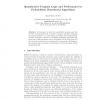Free Online Productivity Tools
i2Speak
i2Symbol
i2OCR
iTex2Img
iWeb2Print
iWeb2Shot
i2Type
iPdf2Split
iPdf2Merge
i2Bopomofo
i2Arabic
i2Style
i2Image
i2PDF
iLatex2Rtf
Sci2ools
125
click to vote
ARTS
1999
Springer
1999
Springer
Quantitative Program Logic and Performance in Probabilistic Distributed Algorithms
In this paper we show how quantitative program logic [14] provides a formal framework in which to promote standard techniques of program analysis to a context where probability and nondeterminism interact, a situation common to probabilistic distributed algorithms. We show that overall performance can be formulated directly in the logic and that it can be derived from local properties of components. We illustrate the methods with an analysis of performance of the probabilistic dining philosophers [10].
ARTS 1999 | Distributed And Parallel Computing | Probabilistic Dining Philosophers | Probabilistic Distributed Algorithms | Quantitative Program Logic |
Related Content
| Added | 03 Aug 2010 |
| Updated | 03 Aug 2010 |
| Type | Conference |
| Year | 1999 |
| Where | ARTS |
| Authors | Annabelle McIver |
Comments (0)

